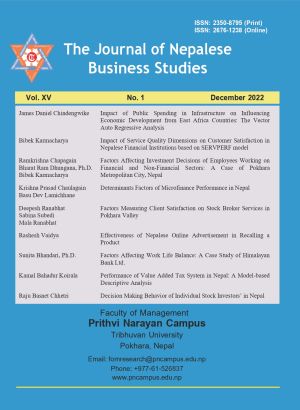Factors Affecting Work Life Balance: A Case Study of Himalayan Bank Ltd.
DOI:
https://doi.org/10.3126/jnbs.v15i1.50393Keywords:
Himalayan Bank Ltd., job satisfaction, Work life balance, quality of family life, quality of work lifeAbstract
Service oriented organizations are focusing themselves on providing effective services via satisfied and customer friendly employees. Himalayan Bank, being one of the reputed commercial private bank in Nepal has a challenge to become an employee-friendly organization for providing quality services to customers. This research is carried out to find the factors that influence the effectiveness of the employees who are responsibly working for the quality, image and prospect of the organization. This article is mainly focused on exploring family responsibilities as well as work responsibilities which have impact on the job satisfaction of the employees working permanently in the bank. Primary data used in this study have been collected through the structured questionnaire distributed to selected employees. Collected data are analyzed by using excel and SPSS. Cronbach’s alpha is calculated to see the reliability of the items used as the instrument to measure variables. Correlation, t-test, regression analysis, F-test as well as post hoc analysis are done to examine the status and impact of variables. Most of the independent variables taken into consideration are found to have significant impact on the dependent variable. Practical and theoretical implications in work life balance is prescribed for practical and theoretical implications in the future.
Downloads
Downloads
Published
How to Cite
Issue
Section
License
Copyright (c) 2022 Journal of Nepalese Business Studies

This work is licensed under a Creative Commons Attribution 4.0 International License.
This license allows reusers to distribute, remix, adapt, and build upon the material in any medium or format, so long as attribution is given to the creator. The license allows for commercial use.




